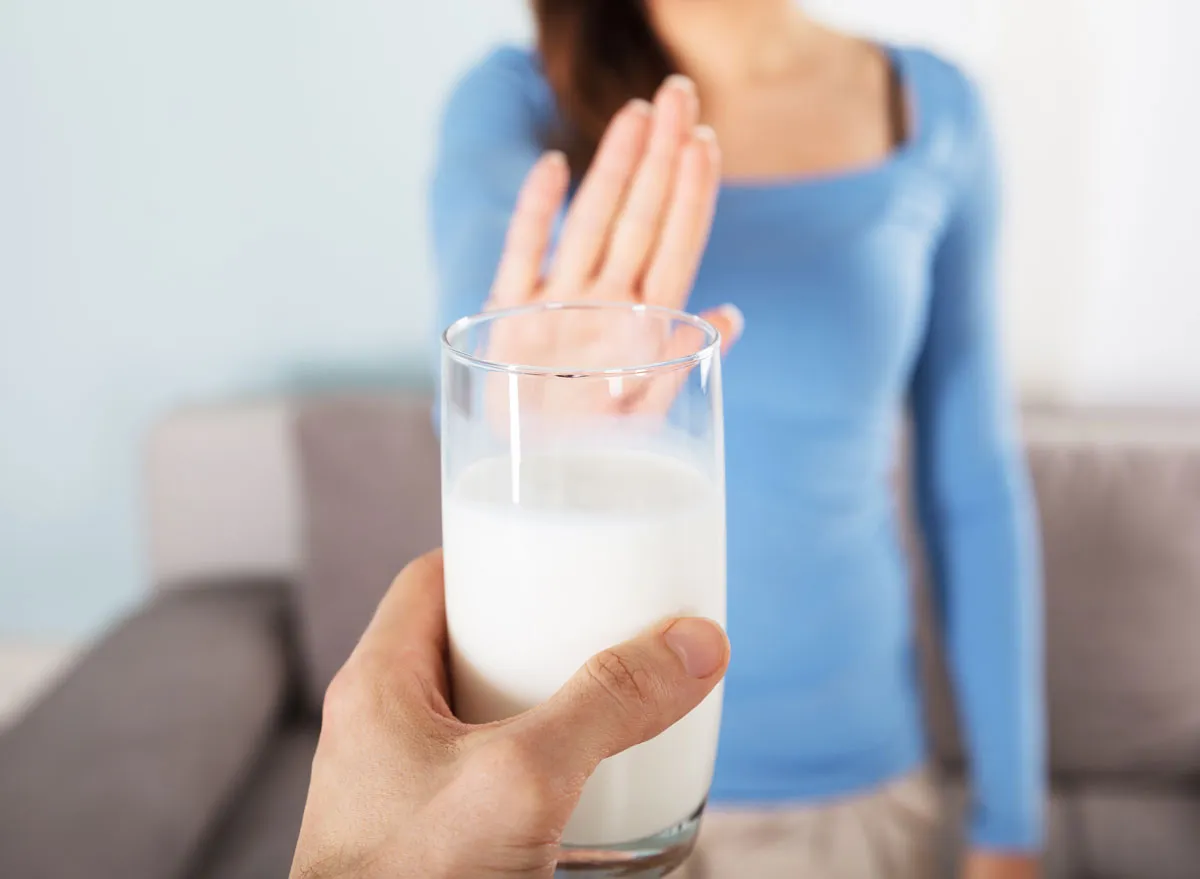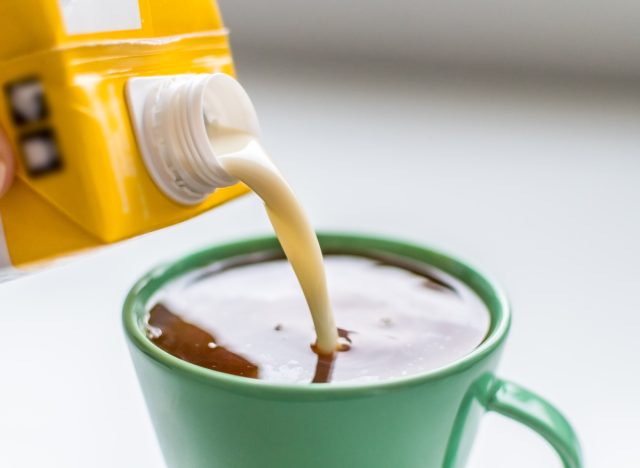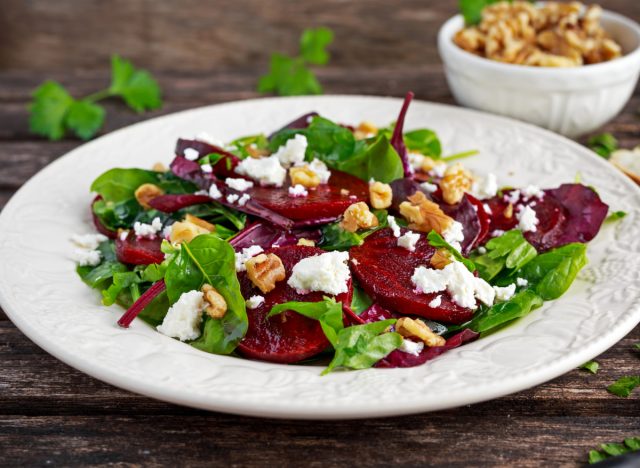I Gave Up Dairy for One Week and Feel Less Bloated and More Energized—But My Skin Hasn't Changed

I grew up having a love affair with dairy. There was no breakfast I loved like a bakery-fresh bagel with butter (I was born in Brooklyn, where the best bagels are made) paired with a latte. And when out with friends, mac and cheese, nachos, pizza, and buttery garlic mashed potatoes were among my very favorite treats.
But as time went on, I developed increasing levels of dairy intolerance that ended up impacting my health and weight.
I knew this was coming—my mom had the same trajectory. In her younger years, she counted pizza and ice cream as her favorite foods, but as she aged, if there was so much as a bit of dairy used to grease the pan that fried her egg white omelet, she would experience stomach issues.
As I entered my late 30s and noticed that a buttermilk biscuit or whipped cream left me with a gurgling tummy and other side effects, I realized my love affair with dairy was probably coming to an end. I could still easily handle cheese, but butter and cream-based products were increasingly becoming an issue. This is common, as research shows that many people develop increasing issues with lactose as they age.
Fast forward to earlier this month: For my birthday week, I dined out in style with various friend groups, starting with a delicious dinner of buffalo mozzarella and cacio e pepe. The next day, I enjoyed creamed spinach and birthday cake. It was all delicious and I don't regret it for a second, but my body cried that it was time to seriously cut back on dairy. All dairy.
So, I pledged to take a break from dairy for one week. For years, I'd been feeling gassy, bloated, and sometimes ill after weekend dairy binges—and I knew my body was being impacted in other ways I didn't even realize. Here's exactly how I cut dairy out of my diet and the effects I felt.
My plan of action

I wasn't planning on a permanent end to all dairy. I know there's still some dairy I can digest pretty well. But, I realized that a week-long dairy elimination plan could help me pinpoint the exact reactions I was having to dairy. And by slowly reintroducing the few dairy items I thought I could still handle one at a time after the week was over, I could see if there was anything that needed to be cut out permanently and what could stick around (at least for a little while).
I kept my diet fairly consistent and just removed dairy products.
As I already had been limiting many kinds of dairy for a long time, there were certain aspects of my routine that didn't have to change. I've been using oat milk creamer in my morning coffee for years now. But my daily morning egg white with goat cheese and spinach omelet was replaced with plain old egg whites and spinach.
For lunch, I'd normally have some variant of a mixed green salad that I'd top with a protein like feta. This week, I subbed that out for avocado on some days and air fryer salmon on others. As for dinner, I leaned heavily into my love of sushi and poke bowls.
While my day-to-day diet was honestly fairly consistent to weeks prior, the dairy element of those meals was gone. It was the ideal elimination diet in that sense.
I didn't try plant-based, non-dairy substitutes.
An important part of a long-term plant-based diet is to find plant-based alternatives to those dairy choices. There's some great non-dairy butters, cheeses, and milks out there. But as this wasn't a long-term change of life but rather a week-long experiment, I didn't want to be introducing all those new items in. Also, as I was carefully watching my reaction to removing items from my diet, I didn't want to confuse matters by introducing new ingredients at the same time—I needed to know if any body reactions, positive or negative, would be due to not eating dairy rather than what new things I was eating in its place.
While the alternatives do exist, a lot of them aren't going to taste as good as the "real" stuff, but sometimes they will. For example, I really enjoy the Brown Sugar Oatmilk Creamer at Trader Joe's – in fact it tastes better than a lot of "real" creamers I've tried.
My results

Well, it's a week later, and I'm currently making my New Year's Eve plans with a small group of friends. And, yes, dairy will be involved! Giving up dairy taught me a few things about my body, namely that I definitely have some level of lactose intolerance, but the most shocking—and exciting—thing was that I can still tolerate some dairy products.
I felt more energized.
I didn't go into this week with the plan to make long-term changes—unless I noticed a huge difference in my body and how I felt after the detox. But I did notice some improvements. During the holiday season, with nonstop activity and eating out, I had been feeling a bit sluggish. I feel a lot more energized now. But, I also had been taking it easy over the holidays and not over-exerting myself. Was it due to R&R, or eating a healthier dairy-free diet that I feel this way?
I didn't notice much of a change in my skin.
I've read in the past that dairy can make Rosacea and other skin issues worse. I have had Rosacea for years, and was hopeful not eating dairy this week would improve those skin issues—however, my skin is exactly the same. Maybe I'd see more difference if I had given up dairy for longer. Also, it's been incredibly cold and windy in New York this week, so it is possible that the dry and cold air was itself a trigger even when the dairy trigger was removed. In any event, the dairy-related skin aspect of this experiment came out pretty neutral.
I felt less bloated.
This was a big one. After my weekend of dairy for my birthday, I felt so uncomfortably gassy and bloated for days. After a week without dairy, I don't feel bloated at all. That is a sign that my body does have issues digesting lactose, but also that eating too much of anything compared to trying to reign it in and be healthy will make your body feel better. My body absolutely was feeling uncomfortable with the dairy, but better without it. I also didn't wake up a single time all week with an upset stomach in the middle of the night after an indulgent dinner—which, I shudder to share, had been happening a lot in the past.
I think we sometimes ignore intolerances, food or otherwise, because we don't want to give those items up. We know that too many martinis give us headaches, but we still long for the good feeling of enjoying those martinis. I think, in a large way, food intolerances are exactly the same. We can see what that food is doing to us, but at the same time, we enjoy experiencing those foods so much that we're avoiding accepting the reality that it would benefit us to give those foods up.
RELATED: Why Do You Always Feel Bloated? An Expert Weighs In
I was more creative in the kitchen.
Giving up dairy was also an opportunity to be creative and try new ingredients in recipes. I've long kept cans of coconut milk on hand for my curry dishes, but when I made a tomato soup during an especially cold Christmas Eve, I experimented with adding coconut milk rather than cream to the recipe. I discovered it was just as creamy and delicious and was missing nothing! It was like my life was a living, breathing basket on an episode of Chopped.
I learned more about what foods have dairy ingredients in them.
Dairy is in a lot more things than we all realize. We may know that we're not supposed to butter our potatoes or add whipped cream to our fresh fruit, but chances are it is hidden in a lot of restaurant foods we don't even consider. My week without dairy forced me to ask more questions about ingredients and learn what was really in what I had been eating all along. Some things may surprise you—they did for me!
Limiting my dairy consumption going forward

I'm still planning on having feta on my salads, goat cheese in my morning omelets, and grated parm on my pasta. Luckily, cheese doesn't seem to be a trigger for me right now. But all other dairy products are, so I'm no longer bending the rules for those butter or cream-based sauces in the name of special occasions—no matter how fun or delicious they may look.
Eating a healthy and balanced diet is about moderation, and I think for me, that's what the message was. Too much dairy was not good for me, and my body was feeling sluggish and bloated as a result, but a complete dairy detox long-term is probably not necessary—at least not yet. In moderation, eating some sort of dairy remains fine for me. But do I need to do other types of dairy? Or dairy at every meal? Absolutely not.
Lactose intolerance is incredibly common but I think it is important to remember that it's also something that different people experience in different ways. While some may be able to digest no dairy at all—like my mom—some are just sensitive to certain types or a large amount of dairy. But if you are in love with cheese and your body seems to be OK with it, go for it. It is a source of calcium after all!









